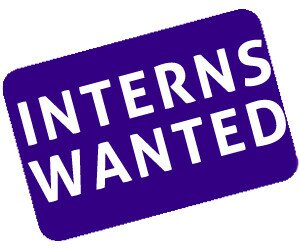 Not all PR internships are created equal. Some PR firms, and in-house comms teams, offer really fabulous internship experiences for students and graduates but there are others that are really below par and a disappointing experience for the intern. I imagine they don’t add much value to the company either. So here’s my quick and easy guide to offering a really solid PR internship for PR employers.
Not all PR internships are created equal. Some PR firms, and in-house comms teams, offer really fabulous internship experiences for students and graduates but there are others that are really below par and a disappointing experience for the intern. I imagine they don’t add much value to the company either. So here’s my quick and easy guide to offering a really solid PR internship for PR employers.
Why are you doing it?
What are you hoping to get out of offering interns experience? Some firms like to use it as a tester before they hire junior staff, some feel that it’s their responsibility to help grow good talent for the industry so do it because they think they should, and some are really busy and need extra pairs of hands to help and interns are a good short-term gap fill for that. All of those reasons are really valid, but you need to make it clear when hiring interns what your reasons are and whether there is any real prospect of a permanent role (or the opportunity to apply for one) at the end of the placement.
Should you pay interns?
The short answer is, yes. Interns should be paid at least minimum wage by law* although it seems some companies haven’t quite grasped that idea. Be aware that HMRC are clamping down on employers who don’t pay interns and there can be a hefty fine involved if your company is found to be employing them for less than they are legally entitled to. Travel and expenses is not enough I’m afraid – they need to be paid properly. Both the CIPR and PRCA have campaigned for properly paid PR interns and it can affect your membership of both organisations if it’s found you are taking on unpaid workers.
*The exceptions to this is if they are volunteering to work for a charity with no benefits in kind (so no promise of a job at the end of it, for example), if they are undertaking a student placement for less than a year or if they are purely shadowing an employee – that means not working for the company at all and only observing.
How long should internships be?
This is pretty much up to you but I would suggest that anything less than a month is a bit of a waste of time for both parties. It takes that long to really get used to doing a job and so for them to be useful to you, and for them to actually learn anything, three to six months is probably a better length of service.
How do you find the best interns?
Social media is your friend here. There are lots of students and graduates constantly looking for PR experience so using your Facebook and Twitter accounts is a good first step. The hashtag #PRjobs is also a useful tool on that front, you can advertise your internship on PR Job Watch – my PR recruitment Facebook page with 7,000 members for FREE and Future Rising is also currently free to use.
You should also consider using the university job boards as many of them are free to use as long as you are paying at least minimum wage. Creative Opportunities from the University of the Arts London is a particularly good one. There are also a couple of paid job boards worth considering; Media Argh charge only £30 so that’s definitely worth a punt. The Guardian online can get some good results but at £480 for a week is a bit ouchie on the price side and PR Week is similarly expensive unless you already advertise loads with them in which case I suspect you’d be able to negotiate a deal.
If you’re looking to improve your company’s ethnic diversity you can also send your internships and entry-level job role details to me and I’ll pass them on to the alumni network of the Taylor Bennett Foundation and encourage them to apply. We don’t charge a fee to hire one of our alumni, but we do ask that you make an appropriate donation to the charity should you take one on.
Ask for something specific during the recruitment process – 400 words on why they want to work there, a one minute video selling themselves, a campaign idea for a particular brand, proof of their social media prowess etc – it’ll weed out the applicants who just apply for everything and will make it easier to identify those candidates who really are committed to the industry.
What do you expect?
It’s important that you set expectations with your interns from day one and that includes very basic instructions like the hours they should work (and is it actually okay for them to walk out the door at 5.30 or is there an unwritten rule that everyone stays until the manager says to go… make it clear), what to do if they’re ill, what they should do if they’re going to miss a deadline, what they should wear (this sounds obvious but it worries many interns), when they should take a lunch break, are there confidentiality issues and non disclosure agreements in place, if they have a late meeting out of the office which finishes at 4pm are they expected to come back to work afterwards, should they contribute during brainstorming meetings or just be there to observe, if they speak to a client how should they introduce themselves and so on.
Making these things clear from the outset means that both of you are aware where you stand. You should also keep in mind that for many interns this may be their first and only experience of working in a professional environment and so they will inevitably make mistakes. This is the whole point of interning – better to make mistakes then than when they go into their first permanent role. Be prepared to make allowances and let them learn from those errors – although making them more than once means they don’t listen very well.
What should interns do?
This is an interesting question and of course the answer will vary from company to company. As a rule of thumb you should treat them as a trainee account exec/press officer. The whole point of the internship from their point of view is to find out what it’s like to work in the industry and so that means doing an entry-level role as much as possible. You might want to task them with a particular project that they can concentrate on for the entire length of the placement, which they can work on in between the daily tasks they’ll be given. This will also mean there’s less chance of them sitting around bored when there’s not much for them to do.
It’s also a good idea to give them some training or induction of some sort. The graduates I speak to about their internships mostly complained that they didn’t mind doing the junior work, but it would have been useful to know why they were doing it. If you can spare someone to give an overview of the company, the clients and campaigns and why junior work is vital to the running of the team that would be helpful. It also might be a good idea for them to fill in daily timesheets or write a daily blog so that at the end of the internship, you can use those to help them write about the experience on their CV.
It’s also okay to ask them to make tea and coffee – just as long as you’re prepared to make them one too.
Who should manage interns?
You might use taking on interns as an opportunity for your most junior staff to manage someone and that’s absolutely fine, there’s nothing wrong with that otherwise how will they learn? But it’s a good idea to have some back up management plan in place to help guide your AEs when managing interns and to make them aware of what is expected both of them, and of the intern.
What happens after the internship?
Some firms use internships as a kind of ‘try before you buy’ scheme to see if any of the interns really shine and stand out as solid performers. It’s not a good idea to promise a job at the start of an internship but the opportunity to apply for one, if available, will be a good incentive to get committed people on board. Increasingly though, companies might offer internships with no intention of hiring one and that’s fine too. In that case, it’s still a good idea to find a way to keep in touch with your intern alumni regularly – even if they go off to work for a competing firm you may decide once they have a couple of years of experience that you’d like to try and hire them so it’s best to remain on good terms with them and touch base regularly. If they had a brilliant internship experience with you there’s every chance that they’ll want to work for you in the future and that opportunity might be many years down the line.
Like this:
Like Loading...
 Over the past couple of months I’ve been pulling together my annual ‘150 PR internships and graduate schemes‘ list.
Over the past couple of months I’ve been pulling together my annual ‘150 PR internships and graduate schemes‘ list.




